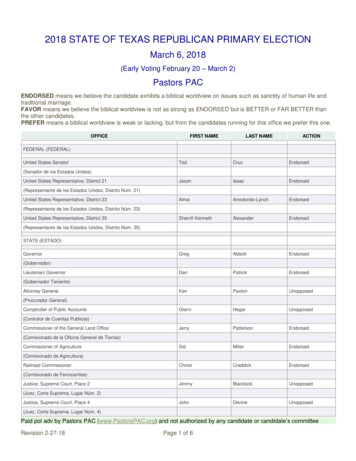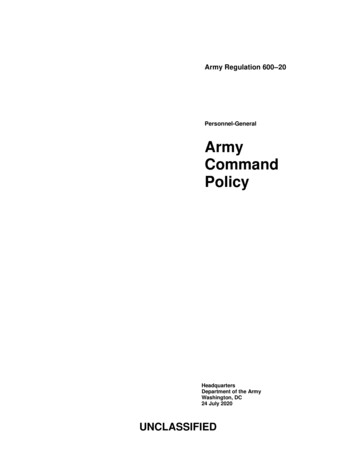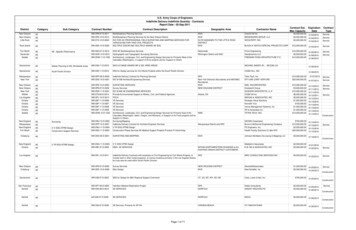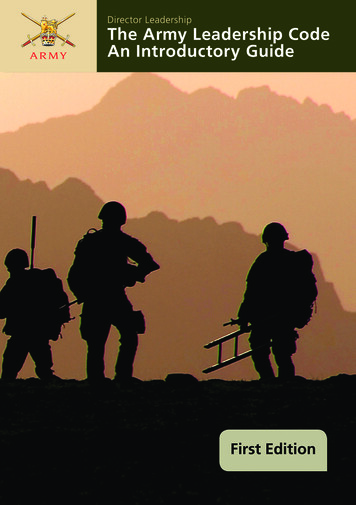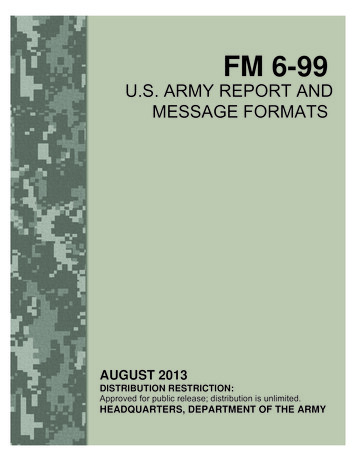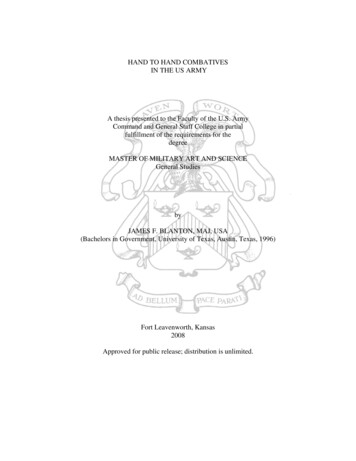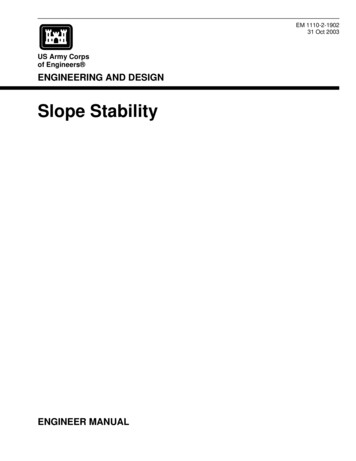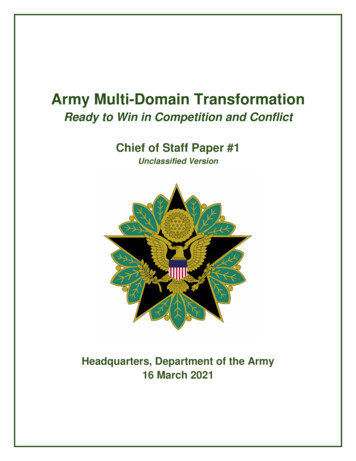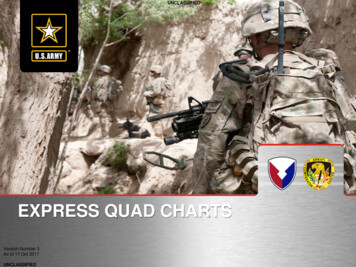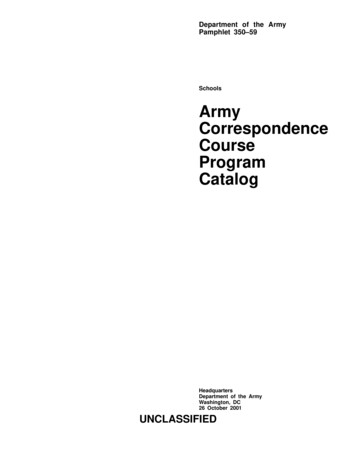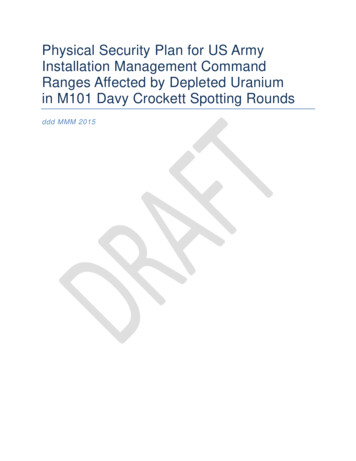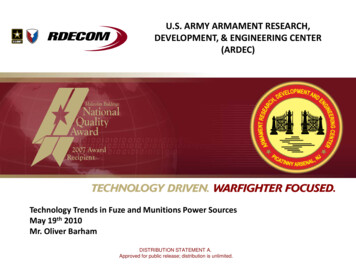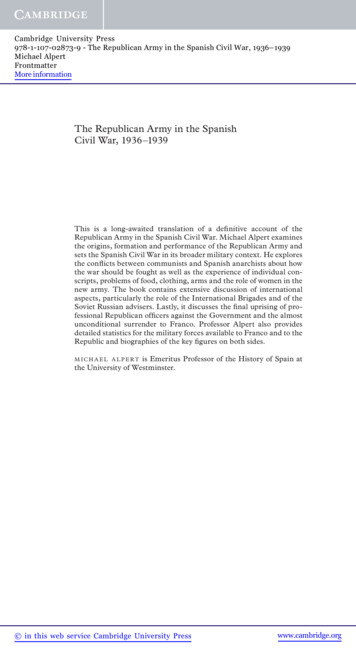
Transcription
Cambridge University Press978-1-107-02873-9 - The Republican Army in the Spanish Civil War, 1936–1939Michael AlpertFrontmatterMore informationThe Republican Army in the SpanishCivil War, 1936–1939This is a long-awaited translation of a definitive account of theRepublican Army in the Spanish Civil War. Michael Alpert examinesthe origins, formation and performance of the Republican Army andsets the Spanish Civil War in its broader military context. He exploresthe conflicts between communists and Spanish anarchists about howthe war should be fought as well as the experience of individual conscripts, problems of food, clothing, arms and the role of women in thenew army. The book contains extensive discussion of internationalaspects, particularly the role of the International Brigades and of theSoviet Russian advisers. Lastly, it discusses the final uprising of professional Republican officers against the Government and the almostunconditional surrender to Franco. Professor Alpert also providesdetailed statistics for the military forces available to Franco and to theRepublic and biographies of the key figures on both sides.m i c h a e l a l p e r t is Emeritus Professor of the History of Spain atthe University of Westminster. in this web service Cambridge University Presswww.cambridge.org
Cambridge University Press978-1-107-02873-9 - The Republican Army in the Spanish Civil War, 1936–1939Michael AlpertFrontmatterMore informationOther works on the Spanish Civil War by the authorLa guerra civil española en el mar, Madrid: Siglo Veintiuno, 1987; rev. ednBarcelona: Editorial Crítica, 2008A New International History of the Spanish Civil War, Houndmills: PalgraveMacmillan, 1994; rev. edn 2004. Translated as Aguas Peligrosas: Nueva HistoriaInternacional de la Guerra Civil Española, Madrid: Akal, 1998 in this web service Cambridge University Presswww.cambridge.org
Cambridge University Press978-1-107-02873-9 - The Republican Army in the Spanish Civil War, 1936–1939Michael AlpertFrontmatterMore informationThe Republican Army in theSpanish Civil War, 1936–1939Michael Alpert in this web service Cambridge University Presswww.cambridge.org
Cambridge University Press978-1-107-02873-9 - The Republican Army in the Spanish Civil War, 1936–1939Michael AlpertFrontmatterMore informationCA M BR IDGE U N I V ER SIT Y PR ESSCambridge, New York, Melbourne, Madrid, Cape Town,Singapore, São Paulo, Delhi, Mexico CityCambridge University PressThe Edinburgh Building, Cambridge CB2 8RU, UKPublished in the United States of America by Cambridge University Press,New Yorkwww.cambridge.orgInformation on this title: www.cambridge.org/9781107028739Original title: El Ejército Popular de la República, 1936–1939 Michael Alpert, 2007 Editorial Critica, S. L.Avda. Diagonal 662-664, Barcelona 08034 (Spain)This publication is in copyright. Subject to statutory exceptionand to the provisions of relevant collective licensing agreements,no reproduction of any part may take place without the writtenpermission of Cambridge University Press.First published in Spanish by Editorial Critica, S. L. 2007First published in English by Cambridge University Press 2013Printed and bound in the United Kingdom by the MPG Books GroupA catalogue record for this publication is available from the British LibraryLibrary of Congress Cataloguing in Publication dataAlpert, Michael, 1936– author.[Ejército Popular de la República, 1936–1939. English]The Republican Army in the Spanish Civil War, 1936–1939 / MichaelAlpert.p. cm.Includes bibliographical references and index.ISBN 978-1-107-02873-9 (hardback)1. Spain–History–Civil War, 1936–1939. 2. Spain. Ejército Popularde la República. I. Title.DP269.23.A47 2013946.081′42–dc232012035322ISBN 978-1-107-02873-9 HardbackCambridge University Press has no responsibility for the persistence oraccuracy of URLs for external or third-party internet websites referred to inthis publication, and does not guarantee that any content on such websites is,or will remain, accurate or appropriate.Every effort has been made to secure the necessary permission to reproducethe cover image, but it has not been possible to trace the copyright holder. Ifthe correct acknowledgement is brought to our notice, we will be happy toinclude in any reprint of the work. in this web service Cambridge University Presswww.cambridge.org
Cambridge University Press978-1-107-02873-9 - The Republican Army in the Spanish Civil War, 1936–1939Michael AlpertFrontmatterMore informationContentsList of mapsList of tablesPrefaceArchival sourcesNotes on the textList of abbreviationsMapspage viiviiiixxiixiiixivxv1The Spanish Army in 193612Military and paramilitary forces in Spainon 18 July 1936173The militia months: July–December 1936294Militarisation595Professional officers in the Republican Army856A new officer corps1187The experience of individuals1578The political commissars1749The communists, the anarchists and theRepublican Army20210International aspects21911Reorganisation25812The Casado uprising275Conclusions303Appendix 1: Unit establishments of the Republican ArmyAppendix 2: History of the 2nd Mixed Brigade315317v in this web service Cambridge University Presswww.cambridge.org
Cambridge University Press978-1-107-02873-9 - The Republican Army in the Spanish Civil War, 1936–1939Michael AlpertFrontmatterMore informationviContentsAppendix 3: Generals of the Spanish ArmyAppendix 4: Biographies of significant officers and politicalcommissars of the Republican ArmyBibliographyIndex in this web service Cambridge University Press319322353367www.cambridge.org
Cambridge University Press978-1-107-02873-9 - The Republican Army in the Spanish Civil War, 1936–1939Michael AlpertFrontmatterMore informationMaps1 Franco’s control of Spain, 1936–9, adaptedfrom Michael Alpert, A New International Historyof the Spanish Civil War (Macmillan, 1994)2 One year of the rebel conquest, adapted fromNew York Times, 24 October 19373 Spain in the summer of 1938, adapted fromNew York Times, 31 July 1938page xvxvixviivii in this web service Cambridge University Presswww.cambridge.org
Cambridge University Press978-1-107-02873-9 - The Republican Army in the Spanish Civil War, 1936–1939Michael AlpertFrontmatterMore informationTables2.1 Number of men in barracks in July 19362.2 Initial manpower in the major Arms available toeach side2.3 Number of paramilitary comandancias available toboth sides8.1 Pay of commissars9.1 Senior commands in CNT hands, September 193610.1 Estimated amounts of war material sent toSpain 1936–912.1 The Casado coup: contrasting chronologiespage 191921186215245281viii in this web service Cambridge University Presswww.cambridge.org
Cambridge University Press978-1-107-02873-9 - The Republican Army in the Spanish Civil War, 1936–1939Michael AlpertFrontmatterMore informationPrefaceOn 18 July 1936 military insurgents in Spain declared a State of Warwithout the consent of the Government, with the aim of overthrowingthe Popular Front Government of the Spanish Republic. The uprising was successfully resisted in many parts of Spain, and thus developed into the Civil War of 1936–9, ending with the victory of GeneralFranco on 1 April 1939. The Republic constructed what was in effecta new army, which it called the Popular Army of the Republic (EjércitoPopular de la República). In the Republican press the Popular Army (theSpanish adjective popular means ‘of the people’ but to call it ‘People’sArmy’ would suggest a similarity to forces which did not exist at thetime, as well as begging the question of communist influence) was alsooften called the Spanish Army, to underline the fact that Franco’s forceswere foreign, as indeed they were to a greater extent than those of theRepublic. Its opponents generally called it the ‘Red’ Army or EjércitoRojo. Here it is called the Republican Army.The Republican Army consisted of the remainder of those partsof the Spanish Army, of its war material and of its professional andnon-commissioned officers who had not rebelled and in some cases hadtaken part in the crushing of the rebellion of their fellow officers in theweek of 18–25 July 1936. From these the Republic created a militaryforce which fought the war arising from the coup launched by the largerpart of the officers and the garrisons. The Republican Army became afull-size force of several hundred thousand men, who fought for twoyears and eight months in particular conditions of inferiority.Its interest for historians and military specialists lies in the issues thatarose during the war from arguments about the nature of the army,from the political tensions suffered at the time as they affected the character of a national army fighting a civil war, together with questions ofarmament and politico-military issues regarding appropriate strategy.For military, social and political historians the significant questionslie in the area of the extent to which an army can be ‘revolutionary’,how this term is interpreted and how far discussion of the nature ofix in this web service Cambridge University Presswww.cambridge.org
Cambridge University Press978-1-107-02873-9 - The Republican Army in the Spanish Civil War, 1936–1939Michael AlpertFrontmatterMore informationxPrefacethe Republican Army can be understood and assessed against the criteria of successful forces created in comparable situations elsewhere.The Spanish Communist Party and the Soviet Russian advisers of theRepublican Army inevitably thought in terms of their experience ofthe Russian Civil War of 1918–20. In historical terms, references weremade to the Red Army of the Russian Revolution, the armies of theFrench Revolution of the late eighteenth century and even to the NewModel Army in the English Civil War of the seventeenth century. Intheir turn, the experience of the Spanish Civil War was important forthe Soviet Army, and for the anti-Nazi guerrilla forces of the SecondWorld War, for the Cuban revolutionaries under Castro and for thearmies of communist China and Vietnam.While in the immediate aftermath of the Spanish ‘transition todemocracy’, as it came to be called, which followed General Franco’sdeath in November 1975, interest in the Civil War of 1936–9 whichhad brought him to power seemed to wane, in recent years the volumeof doctoral theses, scholarly work, academic and more popular books,television programmes, websites, Web forums and similar reflectionsof interest has swelled. This book, which had two earlier Spanish editions in 1978 and 1989, though it has never before appeared in English,joined a number of major works on the Second Republic and the CivilWar when another revised and much extended Spanish edition came outin 2007. This edition took into account the work which had appearedsince its first edition, in particular research based on archival materialmade available in the USSR, dealing with international participationand arms supply. Furthermore, in recent years many local histories,personal accounts and biographies have enabled historians to standback and see the Republican Army in a wider context.Spain is a member of NATO and the European Community. It hassuccessfully navigated the shoals of establishing democracy. The CivilWar of 1936–9 is an essential part of its history. The aim of this Englishedition, which incorporates information taken from very recent work byscholars on the individual experiences of conscripts in the RepublicanArmy and reflects new views, is to make an account of the Army, itsinternational volunteers and its Soviet advisers, its political and organisational difficulties and solutions, available to the non-Spanish-readingpublic and to readers interested in military questions in general as wellas in Spain.It would be impossible to name all those people who, beginning withHugh Thomas, the supervisor of the doctoral thesis which was the original form of this book, have contributed to it. Many of them, veterans ofboth sides of the Spanish war, whom I came to know when researching in this web service Cambridge University Presswww.cambridge.org
Cambridge University Press978-1-107-02873-9 - The Republican Army in the Spanish Civil War, 1936–1939Michael AlpertFrontmatterMore informationPrefacexiin Madrid in 1971, are no longer with us. Professional Spanish officerswere of enormous help in interpreting procedures and the vocabulary ofSpanish military matters. The regular seminars on contemporary Spainat the Cañada Blanch foundation in London were a constant stimulus,as have been the communications from descendants of participants inthe war and students of it who frequently send me emails with valuableinformation or usefully challenge me on what they have read in theSpanish editions of this book. Lastly, I must thank Christopher Feeney,who put so much effort into the copy editing of the book.I have occasionally been accused of a certain ‘aseptic’ neutrality. Iplead guilty, because I have tried to deal with facts with as little prejudice as possible. In any case, foreigners who deal with ‘cosas de España’,as Richard Ford’s book Gatherings from Spain of 1830 was called inSpanish, must tread warily and with respect. in this web service Cambridge University Presswww.cambridge.org
Cambridge University Press978-1-107-02873-9 - The Republican Army in the Spanish Civil War, 1936–1939Michael AlpertFrontmatterMore informationArchival sourcesOfficial publications consulted include the Gaceta de Madrid, knownduring the Civil War as Gaceta de la República, and cited as Gaceta, andthe Diario Oficial del Ministerio de la Guerra, later de Defensa Nacional,or daily bulletin of the Army, later National Defence, Ministry, cited asDO or Diario Oficial.British documents are taken from the Foreign Office GeneralCorrespondence series (FO 371) with prefix W (Western) and suffix 41(corresponding to Spain).References to the frequently cited diary of President Azaña are fromthe 1968 Mexico City edition of his complete works (
The Republican Army in the Spanish Civil War, 1936–1939 This is a long-awaited translation of a definitive account of the Republican Army in the Spanish Civil War. Michael Alpert examines the origins, formation and performance of the Republican Army and sets the Spanish Civil War in its broader military context. He explores
